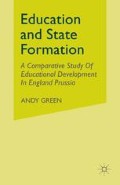Abstract
The development of public education in England contrasts sharply with both the European and US examples in this study. For the greater part of the nineteenth century governments consistently rejected the continental solution of educational development through the state. The dominant tradition in education remained instead the voluntary system, a form of school organization based on private initiative and independent control. This rejection of centralized state control resembled aspects of education in the northern United States, but it failed to match the vigour and dynamism of the latter’s educational development through concerted local initiative. At no point did educational reform achieve the kind of broad consensus over objectives and means which characterized the American experience. Consequently, England remained almost deadlocked over education for many years, postponing major changes long after their importance had been recognized by many of those most closely involved in schooling.
Access this chapter
Tax calculation will be finalised at checkout
Purchases are for personal use only
Preview
Unable to display preview. Download preview PDF.
Notes
D. Fraser, The Evolution of the British Welfare State, 1985, pp. 78–89.
P. Anderson: ‘The Origins of the Present Crisis’, New Left Review, no. 23, January/Feburary 1964; ‘Socialism and Pseudo-Empiricism’, New Left Review, no. 35, January/February 1966; ‘The Figures of Descent’, New Left Review, no. 161, January/February 1987; E. P. Thompson, ‘The Peculiarities of the English’, The Socialist Register, 1965. (An extended version of this in his The Poverty of Theory, 1978); T. Nairn, The Break-Up of Britain, 1981;
E. J. Hobsbawm, Industry and Empire, 1969;
D. Marquand, The Unprincipled Society, 1988; M. Weiner, English Culture and the Decline of the Industrial Spirit.
R. Johnson, ‘Barrington Moore, Perry Anderson and English Social Development’ in C.C.C.S. Culture and Domination, WPCS 9, Spring 1976, p. 21.
E. J. Hobsbawm, article in Marxism Today, April 1988.
R. Gray, ‘Bourgeois Hegemony in Victorian Britain’, in J. Bloomfield (ed.), Class, Hegemony and Party, 1976, p. 80.
J. Simon, Education and Society in Tudor England, 1966.
R. O’Day, Education and Society, 1500–1800, 1982; B. Simon, The Two Nations and the Educational Structure, p. 27.
E. Reisner, Nationalism and Education Since 1789. A Social and Political History of Modern Education, 1925.
T. Wyse, Education in the United Kingdom, Central Society of Education, 1837, pp. 59–60.
Smith, An Inquiry into the Nature and Causes of the Wealth of Nations, 1785, Book v, ch. 1, pp. 276–305.
Quoted in F. Cavenagh (ed.), James and John Stuart Mill on Education, 1931, pp. 1, 29, 12.
Quoted in A. J. Taylor, Laissez-Faire and State Intervention in Nineteenth Century Britain, 1972, p. 23.
J. S. Mill, On Liberty, in Utilitarianism, M. Warnock (ed.), 1986, pp. 239–40.
This is the main theme of E. Halévy, The Growth of Philosophical Radicalism, 1928.
Quoted in R. Johnson, ‘“Really Useful Knowledge”: Radical Education and Working-Class Culture’ in J. Clarke, C. Critcher and R. Johnson (eds), Working Class Culture. Studies in History and Theory, 1979, p. 89.
Quoted in D. Vincent, Bread, Knowledge and Freedom: A Study of 19th Century Working Class Autobiography, 1981, p. 135.
E. P. Thompson, The Making of the English Working Class, 1968, p. 824.
W. Lovett, Chartism: A New Organization of the People (1840), in B. Simon (ed.), The Radical Tradition of Education, pp. 247–8.
D. Giddy, Speech in Parliament, in Cobbet’s Parliamentary Papers, 13 July 1807, p. 798.
S. Smiles, Self-Help, 1969, p. 35.
Quoted in J. Roach, Public Examinations in England. 18.50–1900, 1971, p. 41.
J.S. Mill, Autobiography, J. Stillinger (ed.), 1971, p. 37.
This constant theme of M. Arnold, Culture and Anarchy, J. Dover Wilson (ed.), 1981.
Quoted in H. Perkins, The Origins of Modern English Society, p. 293. For the rich culture of middle-class philanthropy see also L. Davidoff and C. Hall, Family Fortunes, 1987.
Quoted in R. Warner, English Public Schools, 1945, p. 25.
Report of the Council of Civil Engineers (1868), quoted in G. Roderick and M. Stephens ‘The Higher Education of Engineers in England in the Nineteenth Century, With Observations on Engineering Training on the Continent and in America,’ in Paedagogia Historica xvi/2, 1976.
Quoted in Sir E. Ashby, Technology and the Academics, 1958, p. 37.
L. Playfair, Industrial Instruction on the Continent, 1952, p. 6.
L. Playfair, Two Lectures Delivered to the Philosophical Institution of Edinburgh On Primary and Technical Education, 1870, p. 51.
W. E. Foster, Speech in House of Commons on 1870 Education Bill, quoted in J. Murphy, The Education Act, 1870, Text and Commentary, 1972, p. 39.
Author information
Authors and Affiliations
Copyright information
© 1990 Andy Green
About this chapter
Cite this chapter
Green, A. (1990). English Education and the Liberal State. In: Education and State Formation. Palgrave Macmillan, London. https://doi.org/10.1007/978-1-349-20709-1_6
Download citation
DOI: https://doi.org/10.1007/978-1-349-20709-1_6
Publisher Name: Palgrave Macmillan, London
Print ISBN: 978-1-349-20711-4
Online ISBN: 978-1-349-20709-1
eBook Packages: Palgrave Social & Cultural Studies CollectionSocial Sciences (R0)

